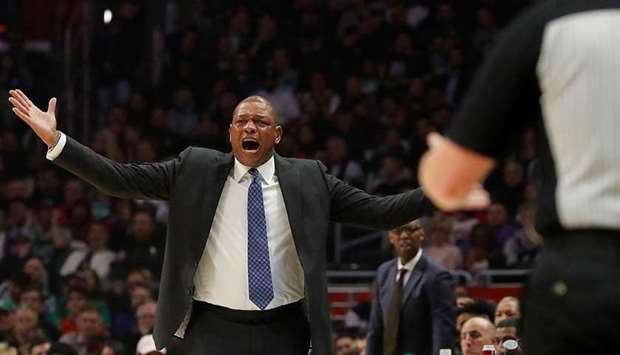Los Angeles Clippers coach Doc Rivers needed no persuading. As soon as Chicago Bears coach Matt Nagy floated the idea of joining a virtual team meeting as a guest speaker, the lifelong fan of the team since he was an elementary schooler in the Wrigley Field stands watching Gale Sayers was all in.
“Talking to the Bears, the whole team, are you kidding me?” Rivers said. “I was jacked up about that.”
Nagy thought his team would be too. But he wasn’t prepared for the response to Rivers’ May 21 appearance. Rivers spoke to 125 players and coaches for 30 minutes, took questions for 45 more and easily have gone another hour. As the meeting ended, a flood of notifications were still lighting up Nagy’s phone – text messages from players and coaches hoping to submit more questions.
“I’ve heard a lot of people talk to groups and Doc, to me, not to take anything away from anybody else, but that was one of the most powerful hour-and-15-minute discussions that I had selfishly for myself and we had as a team,” Nagy said. “Man, there was so much good stuff in there. A lot of the stuff I don’t even want to tell because I don’t want other people to know.”
Bad news for the Bears on that front: In recent weeks, Rivers’ stories from 13 years as an NBA player and 21 as a coach have been heard by hundreds across the NFL during virtual meetings with the Los Angeles Rams and Indianapolis Colts. At a time when live sports are few and far between, there is more time than ever to talk about them and Rivers has become an in-demand guest speaker by filling some of that void with his expertise.
In late April, he stressed the importance of each Ram accepting and dominating their role while mixing in stories about the drive that fuelled Michael Jordan and Kevin Garnett.
“You’re sitting there looking at all the guys and how locked in they were, for a full hour,” coach Sean McVay said afterward. “I don’t think I can keep our guys’ attention for a full hour.” Last week, after an invitation from Indianapolis coach Frank Reich was relayed through quarterback Philip Rivers, a friend of the Clippers coach, Doc dropped into the Colts’ meeting to stress urgency. If you are a true contender, he implored the Colts, “you better go for it now.”
“Even in a Zoom setting,” Philip Rivers said in an email, “his presence and ability to engage was felt and was awesome.”
Doc Rivers told the Bears about the time he scored 54 points in a high school game, only to have his father push him to play even harder. How in 2007 he arranged a Duck Boat tour of Boston for Paul Pierce, Ray Allen and Garnett soon after the Celtics’ superstar trio was formed – an outing he used to have the trio envision travelling the same route the following summer during a championship parade.
Bears players wanted to know about Kawhi Leonard’s leadership style. He’s quiet, Rivers told them, but became more vocal as the season went on.
“He’s got such a great ability in my mind of demonstrating the care for the players but being able to be candid with them,” McVay said. The rave reviews surprise no one who knows Rivers.Brendan Suhr watched the same thing happen in 1983 when, as an assistant coach on Atlanta’s staff, he marvelled at how the team’s second-round pick from Marquette “came in and filled up the room” as a rookie. Little has apparently changed. At a recent coaching clinic organised by Suhr, Rivers discussed what he’d learned from coaching his son, Austin, with the Clippers. It left Suhr in tears.
Rivers repeated the same story to the Bears and Nagy, a father of four basketball-obsessed sons, couldn’t get enough.
“He’s just a very good teacher, and the best teachers make concepts relevant, compelling and applicable,” said Jon Gordon, an author of motivational books including, “The Energy Bus,” a Rivers favourite that sparked their friendship. “If you can help (players) get better, they’ll listen to you. If you can’t, it might feel like a waste of their time. Bring something that makes them better. That’s what Doc does.”
Rivers understands the appeal of his credentials – his 938 career coaching victories are 12th all-time in the NBA – and isn’t ignorant of his reputation as one of the NBA’s best quotes. That doesn’t mean the self-described introvert feels comfortable with the notion that he has become a sideline sage. Instead, he said his success owes largely to two decades of doing exactly what the Rams, Colts and Bears did with him – seeking out others he admires in hopes of gleaning a valuable insight.
“I get information,” he said, “every time I give information.” When he broke into coaching in 1999 with Orlando, both his playbook and his big-picture philosophies owed largely to basketball coaches such as Pat Riley, Chuck Daly, Larry Brown, Mike Fratello and Bob Hill. Last season, he called Boston coach Brad Stevens multiple times for advice. He’s close with Phoenix’s Monty Williams and Dallas’ Rick Carlisle, and envies how former Georgetown coach John Thompson can turn a complex idea into an easily taught concept.
But the former political science and history major’s influences also include speeches by John F Kennedy, Desmond Tutu and Martin Luther King Jr. The inspiration to use the South African philosophy of “ubuntu” as Boston’s mantra during its championship season in 2008 came from listening to Stephanie Russell, a vice president for mission and ministry at Marquette, during a lunch break of the university’s board of trustees.

Los Angeles Clippers head coach Doc Rivers during a game against the Boston Celtics at Staples Center in Los Angeles on November 20, 2019. (TNS)
